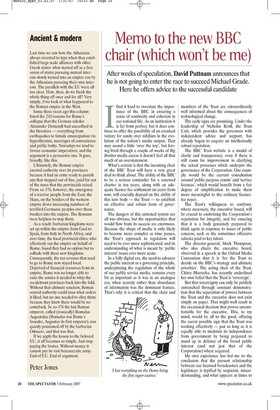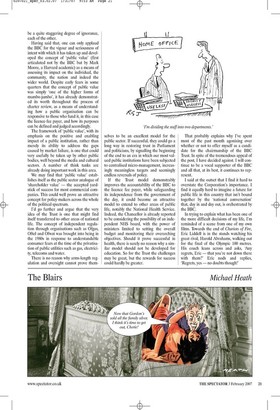Memo to the new BBC chair (which won't be me)
After weeks of speculation, David Puttnam announces that he is not going to enter the race to succeed Michael Grade. Here he offers advice to the successful candidate Ifind it hard to overstate the importance of the BBC in ensuring a sense of continuity and cohesion in our national life. As an institution it is far from perfect, but it does continue to offer the possibility of an eventual victory for sanity over nihilism in the evolution of the nation's media output. That may sound a little 'over the top', but having lived through a couple of weeks of Big Brother media excess it doesn't feel all that much of an overstatement.
What's certain is that the incoming chair of the BBC Trust will have a very great deal to think about. The ability of the BBC to be a serious contender for a renewed charter in ten years, along with an adequate licence-fee settlement six years from now, will crucially depend on the ability of this new body — the Trust — to establish an effective and robust form of governance.
The dangers of this untested system are all too obvious, but the opportunities that would flow from its success are enormous. Because the shape of media is only likely to become more complex as time passes, the Trust's approach to regulation will need to be ever more sophisticated, and its understanding of what is meant by 'public interest' issues ever more acute.
In a fully digital era, the need to advance the public interest as a governing principle, underpinning the regulation of the whole of our public service media, remains every bit as important as it was in an analogue era, when scarcity rather than abundance of information was the dominant feature. That's why it is critical that the chair and members of the Trust are extraordinarily well informed about the consequences of technological change.
The early signs are promising. Under the leadership of Nicholas Kroll, the Trust Unit, which provides the governors with independent advice and support, has already begun to acquire an intellectually robust reputation.
The BBC Trust website is a model of clarity and transparency, even if there is still room for improvement in clarifying the actual processes which underpin the governance of the Corporation. One example would be the current consultation around 'public purpose remits' and 'service licences', which would benefit from a fair degree of simplification to make them more meaningful to the ordinary licencefee payer.
The Trust's willingness to confront, where necessary, the executive board, will be crucial to enshrining the Corporation's reputation for integrity, and for ensuring that it is a body genuinely prepared to think again in response to issues of public concern, such as the sometimes offensive salaries paid to key talent.
The director-general, Mark Thompson, who also chairs the executive board, observed in a speech at the Oxford Media Convention that it is 'for the Trust to decide on the BBC's strategy and ultimate priorities'. The acting chair of the Trust, Chitra Bharucha, has recently underlined her own belief that the Trust is 'sovereign'.
But that sovereignty can only be publicly entrenched through constant demonstration that the separation of powers between the Trust and the executive does not exist simply on paper. That might well result in the occasional decision that proves uncomfortable for the executive. This, to my mind, would be all to the good, offering the surest possible sign that the Trust was working effectively — just so long as it is equally able to maintain its independence from government by being prepared to stand up in defence of the broad public interest (and not just that of the Corporation) where required.
My own experience has led me to the conclusion that the present relationship between our licensed broadcasters and the legislature is typified by suspicion, misunderstanding, and what appears at times to be a quite staggering degree of ignorance, each of the other.
Having said that, one can only applaud the BBC for the vigour and seriousness of intent with which it has taken up and developed the concept of 'public value' (first articulated not by the BBC but by Mark Moore, a Harvard academic) as a means of assessing its impact on the individual, the community, the nation and indeed the wider world. Despite early fears in some quarters that the concept of public value was simply 'one of the higher forms of mumbo-jumbo', it has already demonstrated its worth throughout the process of charter review, as a means of understanding how a public organisation can be responsive to those who fund it, in this case the licence-fee payer, and how its purposes can be defined and judged accordingly.
The framework of 'public value', with its emphasis on the positive and enabling impact of a public institution, rather than merely its ability to address the gaps caused by market failure, is one that could very usefully be taken up by other public bodies, well beyond the media and cultural sectors. A number of think tanks are already doing important work in this area.
We may find that 'public value' establishes itself as the public sector analogue of 'shareholder value' — the accepted yardstick of success for most commercial companies. This could well prove an attractive concept for policy-makers across the whole of the political spectrum.
I'd go further and argue that the very idea of the Trust is one that might find itself transferred to other areas of national life. The concept of independent regulation through organisations such as Ofgas, Oftel and Ofwat was brought into being in the 1980s in response to understandable consumer fears at the time of the privatisation of public utilities such as gas, electricity, telecoms and water.
There is no reason why arms-length regulation and oversight cannot prove themselves to be an excellent model for the public sector. If successful, they could go a long way in restoring trust in Parliament and politicians, by signalling the beginning of the end to an era in which our most valued public institutions have been subjected to centralised micro-management, increasingly meaningless targets and seemingly endless reversals of policy.
If the Trust model demonstrably improves the accountability of the BBC to the licence fee payer, while safeguarding its independence from the government of the day, it could become an attractive model to extend to other areas of public life, notably the National Health Service. Indeed, the Chancellor is already reported to be considering the possibility of an independent NHS board, with the power of ministers limited to setting the overall budget and monitoring their overarching objectives. Should it prove successful in health, there is surely no reason why a similar model should not be developed for education. So for the Trust the challenges may be great, but the rewards for success could hardly be greater.
That probably explains why I've spent most of the past month agonising over whether or not to offer myself as a candidate for the chairmanship of the BBC Trust. In spite of the tremendous appeal of the post, I have decided against. I will continue to be a vocal supporter of the BBC and all that, at its best, it continues to represent.
I said at the outset that I find it hard to overstate the Corporation's importance. I find it equally hard to imagine a future for public life in this country that isn't bound together by the 'national conversation' that, day in and day out, is orchestrated by the BBC.
In trying to explain what has been one of the more difficult decisions of my life, I'm reminded of a scene from one of my own films. Towards the end of Chariots of Fire, Eric Liddell is in the stands watching his great rival, Harold Abrahams, walking out for the final of the Olympic 100 metres. His coach leans across and asks, 'Any regrets, Eric — that you're not down there with them?' Eric nods and replies, 'Regrets, yes — no doubts though!'





















































 Previous page
Previous page